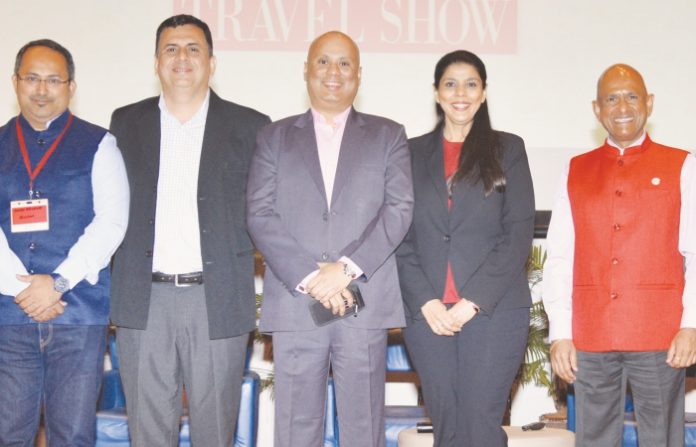Two-day M!CE Travel Show, which recently took place in Pune, intended to stimulate market by fostering synergies between corporate buyers and sellers of travel products and services.
Hazel Jain
The seventh edition of the M!CE Travel Show 2022 concluded successfully in Pune recently by enabling more than 1,100 meetings between exhibitors and corporate buyers from across India under one roof. The two-day B2B tabletop event saw 23 exhibitors meet and interact with 45 key corporate buyers on 23-24 April 2022. Organised by DDP Exhibitions, the exclusive M!CE event plans to replicate this in other cities in India soon. Singapore Tourism Board, Oman Air, Oman Convention Bureau, and Shangri-La were among the key exhibitors, as were some luxury Indian hotel brands such as Ananta Hotels & Resorts and Truly India Camps & Safaris.
The event also saw a serious panel discussion on sustainable business travel on the first day, where panellists opined on the possibilities of reducing carbon emissions while travelling and what entities such as destinations, airlines, hotels, and corporates can do towards this goal.
Moderated by Mritunjaya Chandra Mohan, Senior Manager-Corporate Travel, Palo Alto Networks, an expert on sustainability, the panellists included GB Srithar, Regional Director-India, Middle East, and South Asia, Singapore Tourism Board; Pratima Badhwar, Head of Commercial-India and South Asia, Accor; Ritam Saha, Manager, Passenger and Cargo Services-India, Nepal, and Bhutan, International Air Transport Association (IATA); Gaurav Shekhar Nagwekar, Head (Corporate Travel & Logistics),
Reliance Industries; and Devendra Saraiya, Director-Procurement and Travel, Deloitte Shared Services India.
Introducing the topic was industry influencer Jyothi Varma. She said, “Sustainable travel is a very relevant and important topic today. Everyone is worried about how to go about being sustainable. It is about the environment, it is about recycling and reducing our carbon footprint as a corporate wherever we can.”
Kicking off the discussion, the moderator of the session, Mritunjaya Chandra Mohan, said that sustainability has become a buzzword today. “The pandemic gave an opportunity to many corporate companies to rethink about the environment and sustainability, apart from the safety of employees and overall travel costs,” he said. He shared results of a survey saying that 36.2 per cent of corporates out of the 316 global travel buyers say that the commitment to sustainability has increased once the intensity of the pandemic subsided. However, 14.9 per cent of them say that their company does not have carbon reduction targets and does not expect to implement them, which means that they are still not ready to touch this topic.
Leading the conversation to hotels, Mohan added that a lot of big hotel chains have been working on becoming eco-certified and green hotels, which is now a necessity. Sharing initiatives from Accor, Pratima Badhwar said, “Nowadays every hotel chain has its own sustainability goal. And every hotel has to run its operations as a business unit. At Accor, we have taken up this initiative early on. We launched a project for it in 2005 or so. Cut to now, that initiative is called Planet 2021. We have a target of a net carbon zero footprint by 2050. We even have a Global Chief Sustainability Officer who looks after this.”
What are corporates doing?
Sharing some details about what Deloitte India as a corporate is doing towards this, Devendra Saraiya said, “There are two parts to sustainability. One is that you just want to create brand value for your company, and the other part is that you are actually helping the cause. We are considering sustainability initiatives at Deloitte India, and travel is the largest contributor of emissions.”
Sharing some insights on what Reliance as a corporate has been witnessing of late, Gaurav Shekhar Nagwekar said, “There was a recent study conducted that mentioned how corporate travel is going to evolve. Interestingly, it mentioned that 20 per cent of corporate travellers do not want to come back, specifically from the IT sector. The other 20 per cent of the sector—which is pharmaceuticals, banking, and the like—never left. The remaining 60 per cent are in a dilemma and are not sure if they want to have M!CE movements. These are the facts on the ground. For Reliance, we are also looking at mitigating our carbon footprint. With immediate effect, we have tightened travel restrictions and will investigate how and which departments should actually travel. Secondly, we want to move to accommodation options that have sustainability goals. This does not just include star hotels. I have some disagreement about air travel being one of the largest reasons for emissions. I believe it is the ground transportation, especially when we speak about India.”
Walking the talk
Sharing ideas about how a destination can do its bit towards this goal, GB Srithar underlined what Singapore is doing in this area. He said, “It is a huge challenge. It is such a serious, necessary, existential topic of the hour. Thankfully, for Singapore, it has been on the minds of our leadership, both political and public and private sector partnerships. Singapore is the only country in the world to have a net zero vehicle growth rate as of yet.”
Ritam Saha said, “What IATA and its member airlines have done today is that we have adopted a mission called Fly Net Zero and it is targeted at reducing carbon emissions to zero by the year 2050.”












